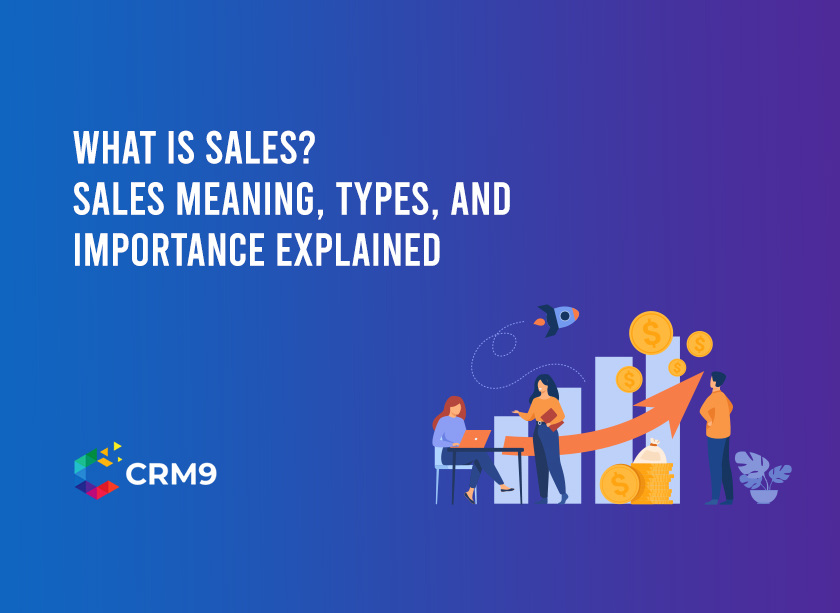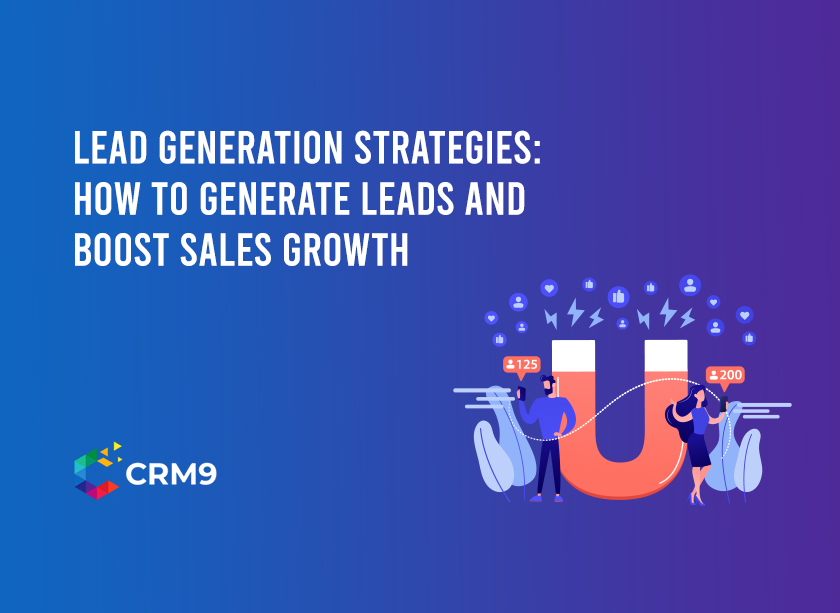Sales are everywhere around us. From the coffee you purchase enroute to work to the annual subscription to the software you use, each transaction has a story of how individuals connect with companies. But what is sales really about? Is it just getting someone to shop, or is there more to it?
In business, selling is much more than closing transactions. It drives growth, establishes trust, and proves ideas in the marketplace. Even the best products or services never get to be seen without any sales. Understanding the sale meaning, the importance of sales, and the different types of sales can make you realize why sales are really the heartbeat of any organization.
What is Sales?
At its core, what is sales? In simple words, sales is the transaction of a product or service in exchange for money or other value. It’s more than just a deal; it is a relationship between a business and its clients.
The sale meaning transcends the actual closing of the deal; it entails identifying customer needs, providing solutions, and creating value that creates trust in the long run.
When people ask, “what’s sales?” it is important to know that it is both a business function and an activity. No good products or services will reach their audience without sales. Sales is therefore the engine that drives visibility, revenue, and growth for any company.
What is Sales in Business?
Now let’s talk about sales in business. In this context, sales go beyond individual transactions. It takes strategy, planning, and execution to get to the customers consistently. Sales meaning in business involves system building, employing the right personnel, and goal setting, so that there is continued growth.
So, what do you mean by sales in business terms? It’s the function that directly generates income. Whether it is a start-up presenting its initial product or an established company venturing internationally, what is sales in business can be defined as the organized method of persuading buyers and providing value. Companies tend to aid this activity with tools such as task management to plan activities, prioritize, and ensure that every step of the process in the sales cycle runs smoothly.
What Are the Different Types of Sales?
There are different types of sales, and each of them has its own style and aim.
The knowledge of such models will assist companies in selecting an optimal strategy.
1. Inside Sales
When the reps are communicating with consumers remotely, such as over calls, emails, or video calls, it becomes inside sales. It is a powerful, affordable, and widespread technique applied in the digital-first world today.
2. Outside Sales
On the other hand, outside sales are made in person. The representatives visit customers, attend trade shows, or visit offices. This type is personal and builds strong relationships.
3. B2B Sales
Business-to-business sales (B2B) entail selling goods or services to businesses. It often includes longer sales cycles and higher-value transactions. Effective lead management is crucial here to track prospects and guide them from initial interest to closing the deal.
4. B2C Sales
Business-to-consumer (B2C) sales are customer-direct sales, usually quicker and based on emotional purchasing decisions. 2C sales are very much needed in retail, e-commerce, and consumer goods areas.
5. Account-Based Sales
This method focuses on high-value accounts where companies create personalized strategies for specific clients. Strong client management is essential in account-based sales to maintain trust and deliver customized solutions.
If you’re wondering, “how many types of sales are there?” the answer is many, but these five cover the most common and impactful models.
Do You Know?
The oldest known sale in history was one that was made in c. 3000 BC in Mesopotamia, in which barter was done using clay tablets as receipts. In a way, those tablets were the earliest form of today’s sales reports!
What is the Importance of Sales?
The importance of selling in any organization cannot be undervalued. Sales is not only about money but also about creating opportunities, developing relationships, and sustainability. Let’s break down why sales matter:
1. Revenue Generation
Without sales, businesses cannot earn money—it’s the lifeblood that keeps every company running. This is the simplest and most essential purpose of sales since it keeps the day-to-day operations, salaries, and investment in its development. The constant stream of revenue enables business organizations to be more innovative, employ more individuals, and increase their market share.
2. Business Growth
Effective sales efforts automatically propel businesses to seek new markets, introduce more product offerings, and reach broader markets. Expansion is the result of persistent selling that creates new portals of opportunity. Businesses may stagnate and fall behind without a working sales engine.
3. Profitability
The sustainability of profits is dependent on the continuity of sales, which not only meets the expenses but also generates shareholder value. The profitable sales enable the company to invest in better infrastructure, technology, and people. Invoices & Estimates correctly ensure transparency of transactions so that businesses can keep track of revenue and stay afloat.
4. Customer Relationships
At its core, sales is about people and forming substantial relationships. When companies know and address customers’ needs, they establish trust that results in repeat business and word of mouth. These deep ties make sales far more than single transactions; they become long-term relationships.
5. Brand Building
Excellent sales experiences extend beyond closing deals; they influence how individuals view a company. Outstanding service extended to customers means they’re likely to go out of their way and recommend the brand to others. Sales teams thus have a core responsibility in building reputation and making the business shine in the marketplace.
6. Business Validation
Regardless of how groundbreaking a product or service is, it doesn’t matter until consumers are willing to pay for it. Successful sales confirm that the business concept satisfies actual demand. That is what makes the investors, workers, and stakeholders sure about the future of the company.
What are the Key Trends Shaping the Future of Sales in Business?
The future of sales in business is changing rapidly as customers, technology, and smart processes reorganize how companies sell. A latest HubSpot sales analysis report discovered that 70% of sales experts are currently experiencing more stringent budget scrutiny, which serves to indicate that teams need to be more strategic than ever before. These are the trends having the most significant influence:
1. AI and Automation
The working of sales teams is transformed with the help of artificial intelligence. AI is smarter and faster in the sense that it predicts buying behavior and responds to customer needs via chatbots. There are mundane tasks, like booking or following up, that can be automated, while software with automated task reminders will ensure that a salesperson will be sure to never miss a lead or opportunity.
2. Data-Driven Insights
The current sales depend on data to make them even smarter. Analytics is providing us with more insight into customer behaviour, buying trends, and demand. It enables businesses to predict trends, price them accordingly, and find out which opportunity is most promising based on this information. What is created is a more focused approach that is time-saving and more effective.
3. Customer-Centricity
Sales is no longer about selling products, but about the customer. Companies can generate value by learning the pain points and providing custom solutions to the pain points. This is a customer-centric approach that develops a greater degree of trust, increased satisfaction, and promotes loyalty. Companies that embrace it are likely to experience retention and referral.
4. Social Selling
Social selling has become one of the most popular trends with LinkedIn and Instagram, as well as TikTok. It means that salespeople engage with potential customers through content, conversations, and networking, and do not even make a pitch. This establishes credibility, pre-warms leads, and makes conversions easier because relationships are built organically.
5. Integration of Sales and Marketing
There is a blurring of sales and marketing. The two teams are not operating separately anymore, but are uniting to carry the customer through the entire process. It is marketing that creates awareness and generates leads and sales that seal deals. Sales and marketing combine to provide coherence, efficiency, and growth to the business.
Pro Tip:
Always follow up on a sales analysis report with your CRM figures. It enables you to spot the hidden opportunities, pinpoint the weakest links, and support your choices with facts instead of speculations.
Conclusion
Sales are the lifeblood of any business. Since it is possible to learn about sales and then understand the different types of sales, it becomes obvious that selling is not only about closing deals, but also about growth, relationships, and brand building. Companies that embrace the emerging trends such as AI, data, and customer-focused will remain competitive in the future. In simple terms, sales in business is not merely a business functional area, but the essence of success.
Related Reads:
Sales Report: Easy Steps, Benefits & Excel Tips for Success
Inbound vs Outbound Sales | Difference, Meaning & Strategies Explained 2025
Sales Analysis Explained: A Complete Guide to Sales Data and Trends
Sales Organization Structure: Types, Purpose & Hierarchy Explained
What is a Sales Plan? Process, Strategy & Templates Explained
Sales FAQs:
It means the structured process of selling products or services to customers to generate revenue and growth.
It refers to the strategies, activities, and systems used to drive income and sustain the organization.
The sales include buying groceries, subscribing to a streaming platform, or even buying a cup of coffee in ordinary life.
There are several, but the most popular ones are inside sales, outside sales, B2B, B2C, and account-based sales.
Sales drive revenue, enable expansion, and validate business ideas, making them essential for long-term success.



